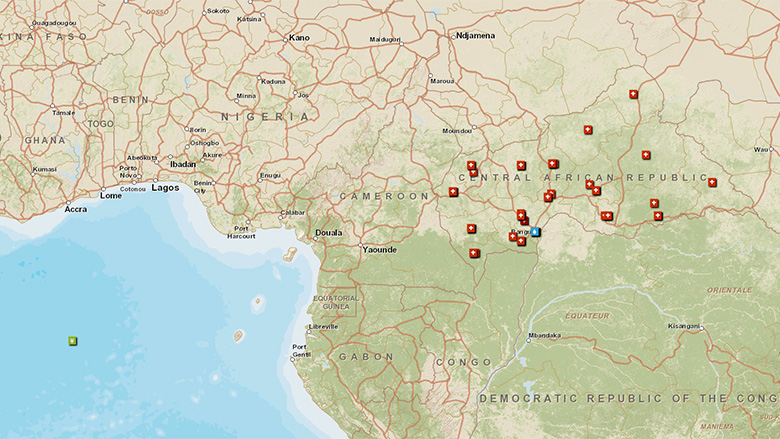Challenge
At the project’s original appraisal in 2000, CAR suffered from political instability, armed conflict, and a poverty rate of 67 percent as recurrent conflicts had pushed CAR to 165 out of 173 countries in the Human Development Report, with life expectancy an estimated 44.3 years. Periodic mutinies and coup attempts destroyed infrastructure and social services, delaying project implementation until 2007, when national elections and peace agreements with key rebel groups had been achieved. Sporadic violence persisted as IDA re-engagement focused on improving delivery of basic social services and HIV/AIDS prevention and control. In 2001, the Joint United Nations Programme on HIV/AIDS (UNAIDS) estimated 10.7 percent of the population aged 15-49 was living with HIV/AIDS, 13,000 to 23,000 of whom were killed by the disease each year. Basic healthcare, primary education and access to water and sanitation are often inaccessible. This situation drove infant mortality to 106 per 1,000 live births, and the percent of malnourished children under 5 years old to 19 percent. Maternal mortality was high, 20 percent of children under 5 years old had malaria, and the teacher-pupil ratio sank to around 1:100, causing 30 percent of pupils to repeat grades and 40 percent not to finish primary school.
Solution
The project was designed to assist CAR in response to urgent social needs, such as increased access to water supply, improved primary education, prevention of malaria and access to prevention treatment and mitigation of HIV. The project consisted of the following four components:
- Support to the National Program against HIV/AIDS ($5.72 million)
Civil society responses to HIV/AIDS based on behavioral changes and support for those affected by the disease were supported. The Ministries of Health, Education, Defense, Social Affairs, and Public Services were assisted in providing prevention services and support to affected individuals, including voluntary counseling and testing services and antiretroviral treatment. The National HIV/AIDS Coordinating Committee received financing and assistance for a national health and HIV/AIDS study. - Support to Emergency Health Needs ($8.33 million)
About 300,000 insecticide-treated nets were distributed to pregnant women and children under five to prevent malaria contraction. Small community projects to address emergency health needs such as rural water supply systems, drainage of marshlands to restrict mosquito reproduction, small medical supplies, and training of health workers also received financing. - Support to Emergency Needs in the Education Sector ($2.64 million)
Teacher training improved quality and the student-teacher ratio, while the project provided textbooks, small furniture, teaching kits, and other education material to underserved primary schools. - Support to Financial Management and Procurement ($2.26 million)
Results
The main outcomes included:
- By March 2012, voluntary counseling and testing was strengthened with new equipment, training, marketing, and logistical support, which resulted in the testing of 118,862 people, including 10,465 pregnant women, 1,999 teachers, and 6,845 military personnel and their families.
- 45 laboratory staff were trained in blood transfusion, 16 labs were provided generators, and medical equipment was provided to 15 health facilities.
- Antiretroviral treatment was provided to 1,624 adults and 95 children.
- 18,448 individuals and families were sensitized by the Ministry of Social Affairs, 8,948 of whom were tested and received results, 332 of whom are now receiving treatment.
- 1,023 teachers were recruited and trained.
- 178,500 textbooks, 5,596 school kits, and 5,130 table benches were distributed.
- 3,000 new curricula were printed, and 22 heads of school districts were trained.
- 192 community microprojects led to 46 forges, 46 water sources, 9 wells, and a set of rehabilitated health facilities.
- 15 restaurants and 19 mini motels were financed for 31 associations of people living with HIV/AIDS.
- Condoms were distributed by the Ministry of Education.
Bank Group Contribution
Despite CAR’s status as a fragile state, the project has made substantial progress. IDA contributed $18.95 million to the project as the sole source of funding. Of this sum, $5.72 million supported people living with HIV/AIDS, $8.33 million supported urgent health needs, $2.64 million supported the education sector, and $2.26 million supported the Financial Management and Procurement Unit.
Partners
Domestic civil society organizations were the main project partners, as the $5.72 million component was focused on supporting and strengthening the work of the Ministries of Health, Education, Defense, Social Affairs, and Public Services.
Moving Forward
The Global Fund to Fight AIDS, Tuberculosis and Malaria will fund 31 Projet multisectoriel
santé, éducation et SIDA (PSES) sites to provide treatment to patients receiving antiretrovirals and expand prevention of mother-to-child transmission, while the government will begin funding the National HIV/AIDS Coordinating Committee. The $38 million Fast Track Initiative Catalytic Fund will support the National Education Strategy through school construction and rehabilitation, as well as teacher training and the provision of education materials. A $28.3 million IDA and Health Results Innovation Trust Fund operation will support utilization and quality of maternal and health services. Finally, a $24 million IDA-financed Additional Financing for the Emergency Urban Infrastructure Rehabilitation Project will improve water supply and drainage while mitigating flood impact.
Beneficiaries
N/A
